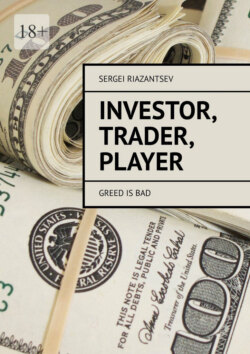Читать книгу Investor, trader, player. Greed is bad - Sergei Riazantsev - Страница 6
Art or science
Starting to learn
ОглавлениеMost major banks are now actively offering investment services. But there is not much literature in which complex financial mechanisms and really working techniques are explained in simple words. Advertising imposes the installation that “to want a lot of money”, “download an application to a smartphone” or “open a brokerage account” in itself means to be an investor.
This is not true. We need knowledge, skills, and experience.
In fact, for a layman, ruin is only a matter of time. According to statistics, from 1% to 2% of traders consistently earn on the market, about the same number work at zero, and about 95% go bankrupt in the period from three to six months. This is one of the most competitive professions in the world.
The trouble of modern man is the focus on a quick result without personal effort. Press the button, poke your finger at the smartphone screen, read an article with funny pictures in three minutes… But this does not work in serious things, and trading is a serious matter. “Investing is easy… it’s easy to play on the stock exchange… open a brokerage account in a minute from your phone and get a stock as a gift” – all these beautiful advertising promises have nothing to do with the real work of a trader.
The modern person does not like “many letters”.
Give him instant working recipes with a guarantee.
If you are looking for something like this, close the book – this is not here.
Linear logic does not work in complex processes. Trading is not a science, because it does not describe constant or cyclical phenomena. The main tool in trading is charts. And this is misleading for beginners: well, of course, charts, numbers, mathematical calculations – what is not science! In fact, the charts only reflect human psychology. Fear, greed, emotions. We will talk about this later.
We will learn how to work with probabilities in conditions of uncertainty. We will learn to think first of all about losses. We will understand the paradoxical logic of trading: a bad road can be good, a good one on the contrary is bad, an obvious decision is unprofitable, an unusual decision is profitable.
I advise beginners to start with two: “Memoirs of a stock speculator” by Edwin Lefebvre and “Encyclopedia of Stock Trading” by Alexander Elder. Read serious books, think, study. Time will do the rest.
Fundamental points:
– It will take as long as it takes. We do not set strict goals and time benchmarks. You have to be completely mentally liberated. Don’t think of training as a project with tight deadlines. Learn with pleasure.
– Trading is complicated by its simplicity: there is nothing in it except arithmetic and common sense. In this book you will not find any incomprehensible things that require higher financial or economic education. But simplicity is not synonymous with lightness. As running is the simplest biomechanical movement, a one-year-old child can quickly move his legs. But running a marathon (42,195 km) is not an easy task.
– Negative experiences are often more important than positive ones. For example, to understand that emotional haphazard trading is the way to nowhere. More precisely, straight to ruin. This most valuable invisible asset will help you all your life.
– We will develop unnatural skills: courage where you want to be scared, and vice versa. Patience is where you want to do everything as quickly as possible. Do not expect psychological comfort. There is simply no such thing in trading.
– Constant self-study, market observation, comprehension of what you saw. Independence in everything, in trading, in analytics, in discipline. You need to learn to be a teacher and a boss for yourself.
